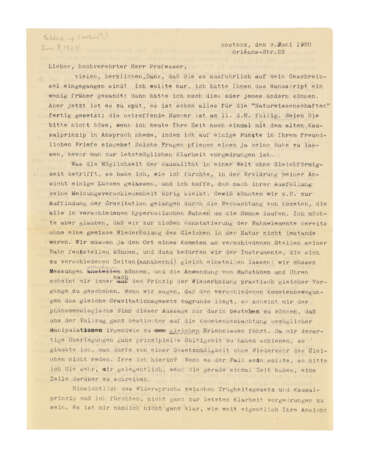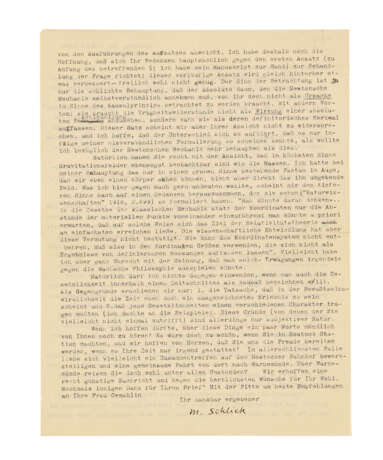ID 369998
Lot 9 | Debating with Einstein about causality
Valeur estimée
£ 1 000 – 1 500
Typed letter signed ('M. Schlick') to 'hochverehrter Herr Professor' [Albert Einstein], Rostock, 9 June 1920.
In German. Two pages, 277 x 211mm. Provenance: formerly in the Manny Moser Collection, PA (according to the Einstein Collected Papers) and at Linda Hall Library, Kansas City, MO (according to Einstein Archives Online).
Debating with Einstein about causality in classical mechanics and general relativity. Schlick responds to a critique by Einstein (in a letter of 7 June) of his forthcoming article 'Philosophical Reflections on the Causal Principle' (published in Naturwissenschaften 8, 461-74), regretting that he cannot now make changes, as the article has 'long since been typeset' and will be published on the 11th. Nevertheless, he pursues the question of the 'old causality principle' here, out of a desire to attain the 'utmost clarity'. Einstein had posited that it would be possible to discover the law of gravitation even on the basis of non-repeating events, giving the hypothetical example of comets on different hyperbolic trajectories: Schlick disagrees, arguing that 'we would not even be in a position to describe the cometary course correctly without a certain repetition of the same in nature'. He then enters further into the question of whether the explanatory role of absolute space in Newtonian mechanics satisfies the principle of causality, suggesting that his position and Einstein's do not differ substantially on this point: 'The initial purpose of the consideration is merely that absolute space, which Newtonian mechanics must obviously assume, does not need to be taken here as a cause, in the sense of the principle of causality. In other words: inertial resistance in certain motions need not be looked upon as effects of an absolute acceleration, but rather can be interpreted as its defining property ... Naturally you are right in your view that in their highest sense gravitational fields are just as observable as masses'. Schlick concludes with a hope that Einstein will be able to stop and see him in Rostock on his way to Norway – even if only for a brief meeting at the railway station.
Moritz Schlick (1882-1936) is best known as the founder of logical positivism and a key member of the Vienna Circle. He was closely interested in the philosophy of science, and had published on both the special theory and the general theory of relativity. This is the retained first draft of a letter which Schlick ultimately sent on the following day, and has significant differences from the version published in the Collected Papers.
Literature: Einstein Archives Online 73-830; cf. The Collected Papers of Albert Einstein, ed. Diana Kormos Buchwald, Tilman Sauer, Ze'ev Rosenkranz, Jozsef Illy, Virginia Iris Holmes (Princeton University Press, 2006), vol. 10, no.51.
| Catégorie: | Autographes et lettres |
|---|
| Catégorie: | Autographes et lettres |
|---|
| Adresse de l'enchère |
CHRISTIE'S 8 King Street, St. James's SW1Y 6QT London Royaume-Uni | |
|---|---|---|
| Aperçu |
| |
| Téléphone | +44 (0)20 7839 9060 | |
| Commission | see on Website | |
| Conditions d'utilisation | Conditions d'utilisation |




